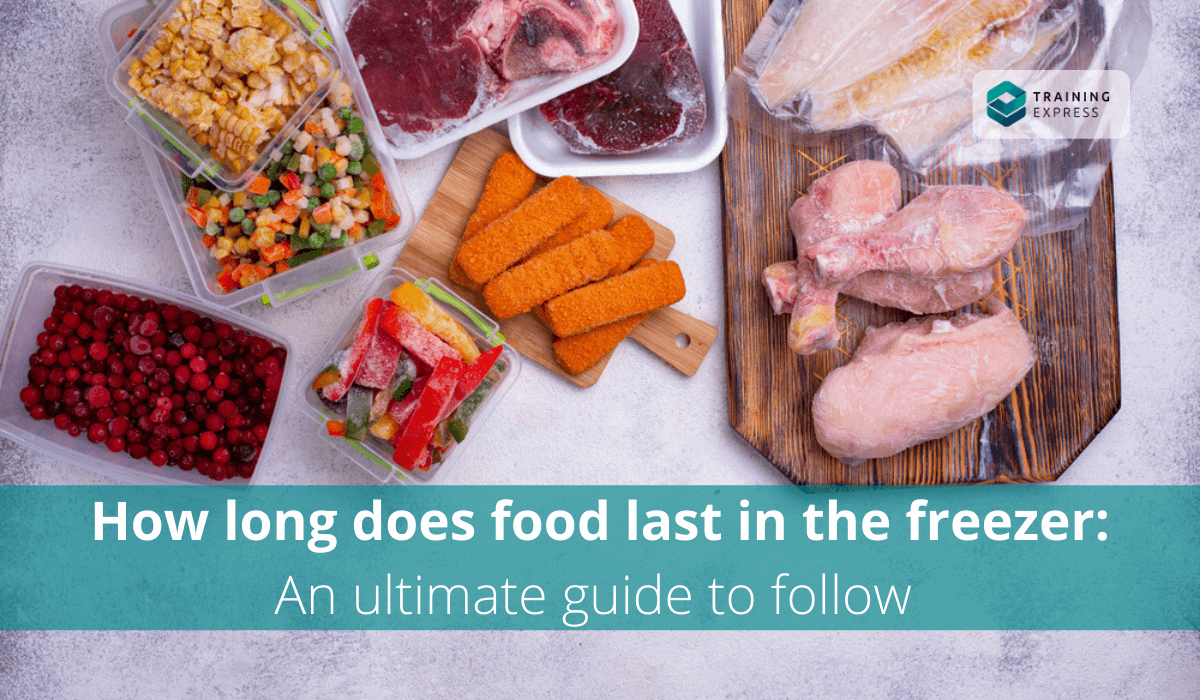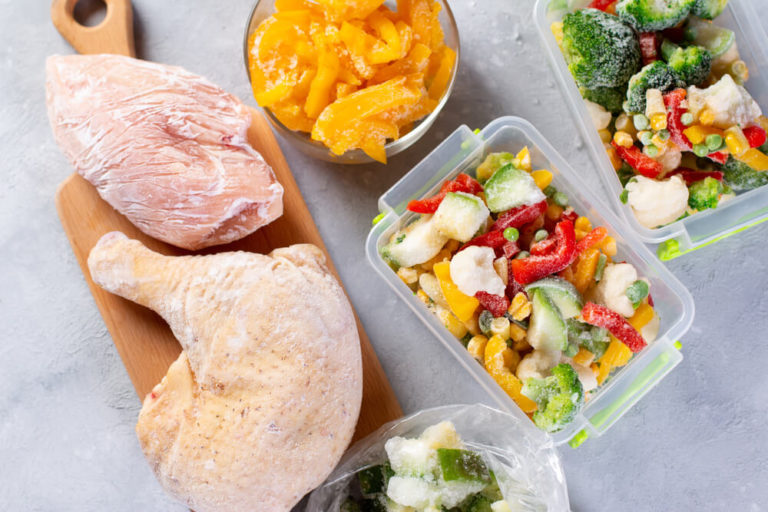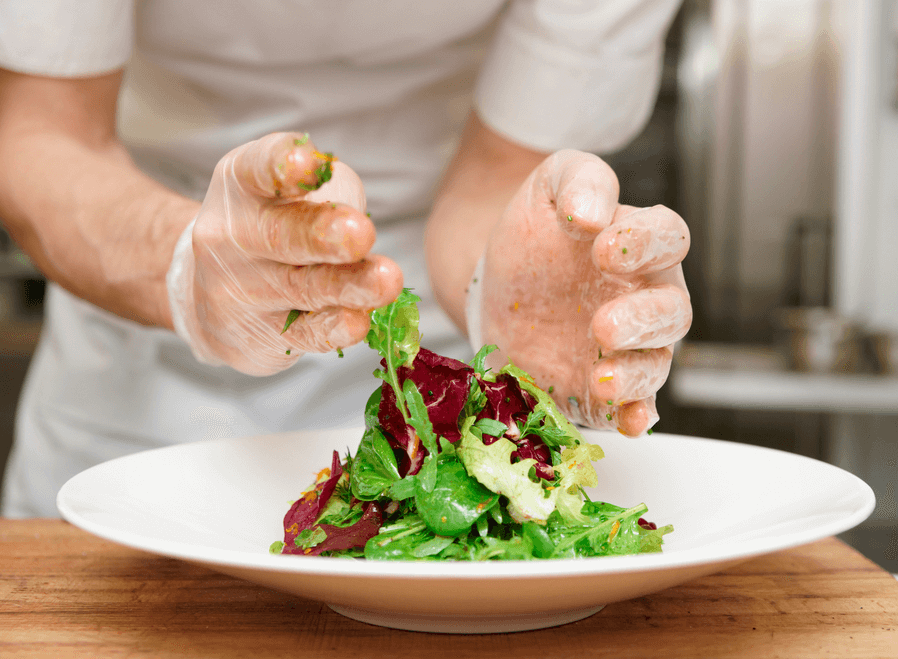
A freezer works like a pause button for food. Food in the freezer doesn’t deteriorate easily, and most bacteria cannot grow while it’s frozen. But we obviously can’t keep food in the freezer indefinitely. So how long does food last in the freezer? Well, it generally depends on the type of food and the temperature of the freezer.
While freezing food is convenient, we should also focus on Food Safety. This guide contains the following information on how long does food last in the freezer along with the following.
Table of Contents
How long does frozen food last in the freezer?
Storing or eating frozen foods past their specific deadlines isn’t necessarily dangerous. However, flavours and textures will start to deteriorate after a certain period. Nevertheless, you can freeze pre-packaged food up to the ‘use by’ date. Also, you should freeze leftovers and home-made goods as soon as possible. As a rule of thumb, frozen food can be kept for three months in a standard freezer before showing signs of freezer burn. The times given below are established based on a freezer set at 0° Fahrenheit (-18 degrees Celsius) or below. (Source: Food Safety)
Different types of food you can keep in the freezer:

1. Bacon and sausage
| Type | Freezer (0° F or below) |
| Bacon | 1 month |
Raw sausage, from chicken, turkey, pork, or beef | 1 to 2 months |
Fully cooked sausage, from chicken, turkey, pork, or beef | 1 to 2 months |
| Sausage purchased frozen | 1-2 months from date of purchase |
2. Hamburger, ground meats and ground poultry
| Type | Freezer (0° F or below) |
Hamburger, minced beef, turkey, chicken, other poultry, veal, pork, lamb, and mixtures of them | 3 to 4 months |
3. Fresh beef, veal, lamb, and pork
| Type | Freezer (0° F or below) |
| Steaks | 4 to 12 months |
| Chops | 4 to 12 months |
| Roasts | 4 to 12 months |
4. Ham
| Type | Freezer (0° F or below) |
| Fresh, uncured, uncooked | 6 months |
| Fresh, uncured, cooked | 3 to 4 months |
Cured, cook-before-eating, uncooked | 3 to 4 months |
Fully-cooked, vacuum-sealed at the plant, unopened | 1 to 2 months |
| Cooked, store-wrapped, whole | 1 to 2 months |
Cooked, store-wrapped, slices, half, or spiral cut | 1 to 2 months |
| Country ham, cooked | 1 month |
Unopened canned food labelled “Keep Refrigerated,” | Do not freeze |
Open canned food, shelf-stable (Note: An unopened canned ham, shelf-stable can be stored at room temperature for up to 2 years.) | 1 to 2 months |
Prosciutto, Parma or Serrano ham cuts, dry Italian or Spanish type | 1 month |
5. Poultry
| Type | Freezer (0° F or below) |
| Chicken or turkey, whole | 1 year |
| Chicken or turkey, pieces | 9 months |
| Chicken or turkey, cooked | 4 to 6 months |
6. Eggs
| Type | Freezer (0° F or below) |
| Raw eggs in the shell | Do not freeze in the shell. Beat yolks and whites together, then freeze. |
Raw egg whites and yolks (Note: Yolks do not freeze well) | 12 months |
Raw egg when accidentally frozen in the shell (Note: Throw away any frozen eggs with a broken shell) | Keep frozen, then refrigerate to thaw |
| Hard-cooked eggs | Do not freeze |
| Egg substitutes, liquid, unopened | Do not freeze |
| Egg substitutes, liquid, opened | Do not freeze |
| Egg substitutes, frozen, unopened | 12 months |
| Egg substitutes, frozen, opened | Do not freeze |
| Eggnog, commercial | 6 months |
| Eggnog, home-made | Do not freeze |
| Pies: Pumpkin or pecan | After baking, 1 to 2 months |
| Pies: Custard and chiffon | Do not freeze |
| Quiché with filling | After baking, 2 to 3 months |
7. Hot dogs
| Type | Freezer (0° F or below) |
| Opened package | 1 to 2 months |
| Unopened package | 1 to 2 months |
8. Luncheon meat/ cold cuts
| Type | Freezer (0° F or below) |
Opened package or deli-sliced | 1 to 2 months |
| Unopened package | 1 to 2 months |
9. Soups and stews
| Type | Freezer (0° F or below) |
| Vegetable or meat added | 2 to 3 months |
10. Salad
| Type | Freezer (0° F or below) |
Egg, chicken, ham, tuna, and macaroni salads | Does not freeze well |
11. Leftovers
| Type | Freezer (0° F or below) |
| Cooked meat or poultry | 2 to 6 months |
| Chicken nuggets or patties | 1 to 3 months |
| Pizza | 1 to 2 months |
| Meat casseroles, cooked | 3 months |
12. Fish, seafood
| Type | Freezer (0° F or below) |
| Fish fillets | 2 months |
| Raw shrimp | 6 months |
| Shellfish (shucked) | 3 months |
Other foods
| Type | Freezer (0° F or below) |
| Yogurt | 2 months |
| Ice cream and sorbet | 2 months |
| Fruit pies, unbaked | 9 months |
| Fruits | 6 to 12 months |
| Cookies, baked or dough | 3 months |
| Tofu | 5 months |
| Butter | 6 to 9 months |
| Bread and cake | 3 months |
How long does canned food last?
Canned food is a healthy, sustainable and cost-effective option. canned food doesn’t have an expiration date. Instead, they have two main labels on Cans – the ‘best-by’ or ‘use-by’ date. Both of these dates are recommended by the food manufacturer. Here is what these terms mean –
‘Best-By’ Date: It is the suggested time to use the product for the best quality or taste.
‘Use-By’ Date: It refers to the final days that the product will be at its peak in terms of flavour and texture. The quality of the food will start deteriorating after this date, but it’ll still be edible.
When stored properly, canned foods are usually good for several years. It’s mainly about quality when you have a ‘best-by’ o ‘’use-by’ date.
How long does cooked food last in the fridge?
Usually cooked food should not be kept in the fridge for more than 3 to 4 days to avoid food poisoning. Moreover, you should throw away all perishable foods that are opened or prepared after 7 days, maximum. If you want to keep them for longer periods, you can keep them in the freezer.

How long does food last in the freezer without power?
By now, you know how long you can keep foods in the freezer. But what happens when there is a power cut? Especially for longer periods? So how long will foods remain safe without power?
The answer is approximately 48 hours when the freezer is full. And if the freezer is half-full, it will be good for about 24 hours. Also, keep the freezer door closed as much as possible. This will help maintain its cold temperature.
Frequently asked questions (FAQs)
Answers to some frequently asked questions regarding keeping food in the freezer are given below –
1. When should you throw out frozen food?
You should throw out any food that has an unusual odour, colour, or texture. Check to see if the food is still at 40 °F or below. If not, it is safer to discard that food. You can use an appliance thermometer in your freezer to check the temperature. You should also throw out food if you suspect food contamination.
2. Can you safely refreeze food that has started to thaw?
Yes, you can. But only if it still has ice crystals or if the temperature is 40° F or below. Otherwise, it would be best if you threw it out. You can safely refreeze or cook frozen food containing ice crystals or if the food is at 40 °F or below.
3. Does food go bad in the freezer?
Technically, no, you can keep them indefinitely. On the grounds that your freezer is in good condition and plugged in, frozen foods will not expire. However, it will affect the taste and texture of food.
4. Can old frozen food make you sick?
Frozen food won’t make you sick if it was frozen and defrosted properly. But if you have doubts, it is better to throw them away. And if you want to eat it, then know how to reheat food safely.
5. Are ice crystals on frozen food bad?
Frozen foods have a small layer of ice crystals on the surface. It is entirely is normal and won’t affect the food’s flavour. However, it is a sign that the food will not taste fresh.
6. Can you eat food with freezer burn?
You can eat food with freezer burn, but the texture and taste might not be up to your liking. When water molecules escape from frozen food, oxygen molecules can also seep in. The oxygen molecules can dull the colour and alter the flavour of your frozen food.
7. Can freezer burn to make you sick?
No. While it’s not harmful to eat, freezer burn does affect flavour and texture. And not in a good way! Although the food might not be very appealing, and the taste might not be up to your standards. Besides that, eating food with freezer burn does not put you at risk for any food-borne diseases.
8. How to get rid of freezer burn?
Unfortunately, there’s no way to reverse freezer burn. What you can do is – remove the affected portion before heating or cooking. To prevent freezer burn, you can reduce the food’s exposure to air.
9. How do you know if frozen food has gone bad?
Never taste food to see if it is good to eat. Because foods that look and smell perfectly all right can still be unsafe to eat. You can tell if the food is bad by the following signs.
- Change in texture
- Smells weird or different
- Package is ripped, or container is broken
- You can’t recall when you froze it
- Defrosted food is sticky or slimy
If you have more questions on Food Safety, take this course given below. This course will give you comprehensive knowledge of food safety, contamination, hygiene and more.
Beware of The 'Danger Zone'
Knowing how to defrost food is essential when you decide to freeze foods. The proper defrosting technique helps avoid food poisoning and various contamination. The Food Standards Agency (FSA) states that most harmful bacteria grow at temperatures above 8° C and below 63° C. This is known as the ‘Danger Zone’ for microbial growth in food. That’s why the safest way to defrost food is in the fridge overnight. By defrosting in the fridge, it eliminates the risk of being in the ‘Danger Zone’. Ideally, your fridge should be 5° C or below because some bacteria can grow at temperatures lower than 8° C.
Closing notes
Food Safety is of paramount importance for safeguarding our health. Many of us prefer frozen foods because of their cost-effectiveness and due to the lack of time. So it’s good to have enough knowledge about it before getting food poisoning or any other illness. Being conscious about Food Safety can help us lead a better and healthier life.
Read more on our blog
- Lots of Likes on Instagram: How You Can Quickly Increase Popularity
- Why You Should Use Photo Background Removers For Mobile Devices
- Maximizing ROI: 11 Strategies For Efficient Advertising Spend
- How to Keep Your Data Safe While Applying for Jobs: 6 Tips
- Take Mac Classes to Transform Your Design Profession
- Exploring the landscape of e-commerce hosting
- Personal Branding For Executives: 7 Tips For Maximum Impact
- Transformative Technologies in Senior Living Homes: A Glimpse into 2024
- Continuous Learning: Navigating the Ever-Evolving Landscape of Software Development
- Challenges and Solutions in Implementing Auto Replenishment for Small Businesses
- Available Courses
- Career Bundles72
- Animal care5
- Law8
- Quality Licence Scheme Endorsed111
- Teaching13
- Teaching & Academics Primary27
- Accounting & Finance Primary30
- Training3
- Design9
- IT & Software43
- Healthcare124
- Marketing31
- Health and Safety400
- Construction48
- Electronics25
- Hospitality22
- Health and Social Care219
- Child Psychology37
- Management370
- Business Skills268
- First Aid70
- Employability264
- Safeguarding75
- Food Hygiene103
- Personal Development1273
 Food Hygiene
Food Hygiene Health & Safety
Health & Safety Safeguarding
Safeguarding First Aid
First Aid Business Skills
Business Skills Personal Development
Personal Development








